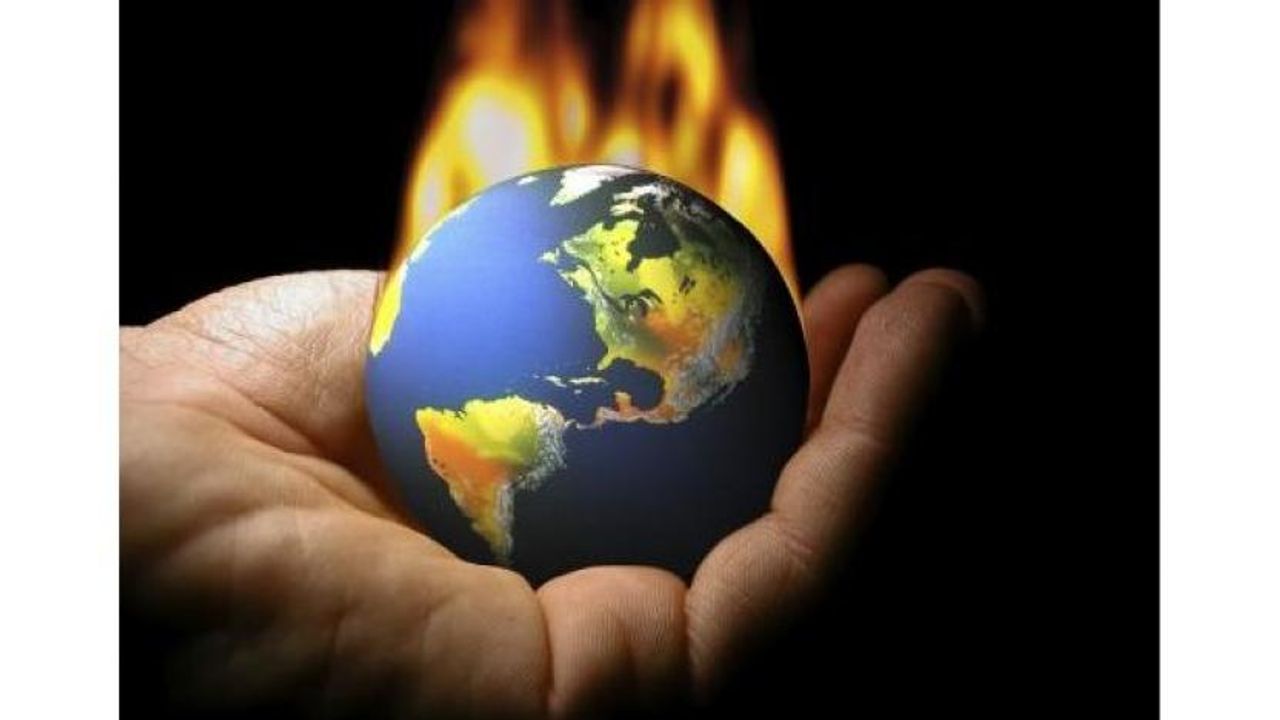 Bolton’s statements were covered in the New York Times on July 7, 1911. The details of the calculations are surprising. Humanity is not just learning about the reasons that lead the planet to the climate crisis.
I wrote an article previously about a climate crisis warning in 1947 in the PolitikYol. The findings of my news search send an imperative message on scientific grounds: the climate crisis is not the crisis of the future, it is the crisis of today, of this moment. If the examples from 1911 and 1947 cannot prove that the crisis belongs to this moment, what else can prove? The findings of those years are very “up-to-date!”
Keeping in mind what Bolton told about the New York of 1911, let's jump to 2022.
Earth experienced June 2022 as the third warmest June in meteorological record-based history. The average temperature of June 2022 was recorded 0.320C above the average temperature between 1991 and 2020.
Europe is burning. The continent experienced the second warmest June in its meteorological record with 1.60C above average temperature. France experienced the warmest May in her history in 2022. Italy declared a state of emergency due to the drought in her northern regions. The UK has been put on a red alert due to the heat waves.
Extraordinary temperatures were not limited to Europe. Above-average temperatures were recorded also in China, Japan, the so-called cold regions of the USA and Greenland.
There are also record-breaking cold temperatures from time to time. What matters is the Earth's average temperature, not the instantaneous weather conditions. The world is warming. Extreme cold winters do not mean there is no climate crisis.
On 18 July, United Nations Secretary-General António Guterres issued a warning message with the phrase "climate emergency". “Collective action or collective suicide,” he said. Suicide! That striking word is preferred to be used by a person occupying an office with international responsibilities.
The economic reflections of the findings of the natural sciences on the climate crisis come to life in the discipline of environmental economics. Economists whose field is not environmental economics also desperately show an increasing interest in issues related to the climate crisis. The main source of production and consumption is nature. Nature is the source of economic growth. The times when growth is under threat are approaching.
There is politics in the economic perspective of the environmental issue. In the US, Senator Joe Manchin of the Democratic Party rejects his party's package of measures against the climate crisis. Could it be because he made millions of dollars from his coal business?
A question to political scientists from the perspective of the climate crisis: how can a political structure be established that will match the politicians’ agenda based on short-term interests with the long-term interests of societies? How can societies’ awareness of their long-term interests in the climate crisis be increased so that their political choices and demands become long-term? There are jobs that far exceed the terms of office of the elected.
The road to the climate crisis is paved by industrial revolutions. The beginning of the industrial revolutions coincides with the 1750s. The rapid population and income growth after the first industrial revolution emerged in the early 1800s.
After visiting the years of 1911, 1947 and 2022, let's go back to 1972. In 1972, a think tank called the Club of Rome requested a study. The work was led by a physicist, Dennis Meadows. The product of this request appeared as a work entitled The Limits to Growth. Meadows and his team arrived at three key conclusions with computer simulations under various scenarios.
First conclusion: if the rates of population growth, industrialization, increase in waste production, increase in food production and natural resource consumption continue at the pace of 1972, it is estimated that the limits of growth will be reached within the next 100 years. The process is likely to end with a sudden and uncontrolled decline in population and industrial capacity. The frontier of The Limits to Growth is 2072.
Second conclusion: it is possible to manage the increase rates in a way that ensures ecological and economic stability and sustainability. A global balance can be established in such a way as to meet the needs of each individual “within the framework of equal opportunity.”
Third conclusion: if humanity tries to reach what the second conclusion says in a short time instead of what the first conclusion says, the chances of success will increase.
1972-2022. 50 years! The Limits to Growth left its mark on history. It talked about the necessity of targeting a global equilibrium instead of an exponential growth because humanity lived on a finite planet.
Dennis Meadows gave an interview to Le Monde for the 50th anniversary of The Limits to Growth. There was a chance in 1972 to keep demographics and consumption bearable, Meadows says. He says that 50 years of a 100-year foresight have been consumed, and that in the first 50 years humanity has not taken any action.
Meadows continues: sustainable development is no longer possible. Green growth is a term that industrialists use to maintain their activities in the same way. Climate change, the depletion of fossil fuels or pollution of waters will lead to turmoil, shocks, disasters, and destruction. When people have to choose between order and freedom, they give up freedom and choose order. I think we will witness a shift towards authoritarian or dictatorial forms of government.
I think Meadows is right. If the world is to remain in the capitalist system, the developed countries must urgently abandon their capitalist understanding. With the current understanding, António Guterres's warnings and calls are meaningless! If there is no change in understanding, humanity will be talking about other regimes. As Meadows thought, as I tried to explain in my article dated July 8, 2022. The work has class aspects at the global and national levels.
With industrialization, democratic processes worked. There were shifts from empires and kingdoms to democratic structures. On the one hand, while these processes were experienced and development was achieved in different geographies, on the other hand, the environmental issue was neglected. Why? Humanity has created a mechanism that contradicts its goals: a capitalist economy that does not take into account the healthy existence of humanity. While industrialization and democracies have been slowly developing, the environmental damage aspect that industrialization ignores will perhaps hit both industrialization and democracy at the end. Civilization contains contradictions within itself.
This article should not cause any sadness to anyone, the reader should be hurt. This article should not cause any worries, the reader should panic. Humanity is in the process of committing suicide.
Bolton’s statements were covered in the New York Times on July 7, 1911. The details of the calculations are surprising. Humanity is not just learning about the reasons that lead the planet to the climate crisis.
I wrote an article previously about a climate crisis warning in 1947 in the PolitikYol. The findings of my news search send an imperative message on scientific grounds: the climate crisis is not the crisis of the future, it is the crisis of today, of this moment. If the examples from 1911 and 1947 cannot prove that the crisis belongs to this moment, what else can prove? The findings of those years are very “up-to-date!”
Keeping in mind what Bolton told about the New York of 1911, let's jump to 2022.
Earth experienced June 2022 as the third warmest June in meteorological record-based history. The average temperature of June 2022 was recorded 0.320C above the average temperature between 1991 and 2020.
Europe is burning. The continent experienced the second warmest June in its meteorological record with 1.60C above average temperature. France experienced the warmest May in her history in 2022. Italy declared a state of emergency due to the drought in her northern regions. The UK has been put on a red alert due to the heat waves.
Extraordinary temperatures were not limited to Europe. Above-average temperatures were recorded also in China, Japan, the so-called cold regions of the USA and Greenland.
There are also record-breaking cold temperatures from time to time. What matters is the Earth's average temperature, not the instantaneous weather conditions. The world is warming. Extreme cold winters do not mean there is no climate crisis.
On 18 July, United Nations Secretary-General António Guterres issued a warning message with the phrase "climate emergency". “Collective action or collective suicide,” he said. Suicide! That striking word is preferred to be used by a person occupying an office with international responsibilities.
The economic reflections of the findings of the natural sciences on the climate crisis come to life in the discipline of environmental economics. Economists whose field is not environmental economics also desperately show an increasing interest in issues related to the climate crisis. The main source of production and consumption is nature. Nature is the source of economic growth. The times when growth is under threat are approaching.
There is politics in the economic perspective of the environmental issue. In the US, Senator Joe Manchin of the Democratic Party rejects his party's package of measures against the climate crisis. Could it be because he made millions of dollars from his coal business?
A question to political scientists from the perspective of the climate crisis: how can a political structure be established that will match the politicians’ agenda based on short-term interests with the long-term interests of societies? How can societies’ awareness of their long-term interests in the climate crisis be increased so that their political choices and demands become long-term? There are jobs that far exceed the terms of office of the elected.
The road to the climate crisis is paved by industrial revolutions. The beginning of the industrial revolutions coincides with the 1750s. The rapid population and income growth after the first industrial revolution emerged in the early 1800s.
After visiting the years of 1911, 1947 and 2022, let's go back to 1972. In 1972, a think tank called the Club of Rome requested a study. The work was led by a physicist, Dennis Meadows. The product of this request appeared as a work entitled The Limits to Growth. Meadows and his team arrived at three key conclusions with computer simulations under various scenarios.
First conclusion: if the rates of population growth, industrialization, increase in waste production, increase in food production and natural resource consumption continue at the pace of 1972, it is estimated that the limits of growth will be reached within the next 100 years. The process is likely to end with a sudden and uncontrolled decline in population and industrial capacity. The frontier of The Limits to Growth is 2072.
Second conclusion: it is possible to manage the increase rates in a way that ensures ecological and economic stability and sustainability. A global balance can be established in such a way as to meet the needs of each individual “within the framework of equal opportunity.”
Third conclusion: if humanity tries to reach what the second conclusion says in a short time instead of what the first conclusion says, the chances of success will increase.
1972-2022. 50 years! The Limits to Growth left its mark on history. It talked about the necessity of targeting a global equilibrium instead of an exponential growth because humanity lived on a finite planet.
Dennis Meadows gave an interview to Le Monde for the 50th anniversary of The Limits to Growth. There was a chance in 1972 to keep demographics and consumption bearable, Meadows says. He says that 50 years of a 100-year foresight have been consumed, and that in the first 50 years humanity has not taken any action.
Meadows continues: sustainable development is no longer possible. Green growth is a term that industrialists use to maintain their activities in the same way. Climate change, the depletion of fossil fuels or pollution of waters will lead to turmoil, shocks, disasters, and destruction. When people have to choose between order and freedom, they give up freedom and choose order. I think we will witness a shift towards authoritarian or dictatorial forms of government.
I think Meadows is right. If the world is to remain in the capitalist system, the developed countries must urgently abandon their capitalist understanding. With the current understanding, António Guterres's warnings and calls are meaningless! If there is no change in understanding, humanity will be talking about other regimes. As Meadows thought, as I tried to explain in my article dated July 8, 2022. The work has class aspects at the global and national levels.
With industrialization, democratic processes worked. There were shifts from empires and kingdoms to democratic structures. On the one hand, while these processes were experienced and development was achieved in different geographies, on the other hand, the environmental issue was neglected. Why? Humanity has created a mechanism that contradicts its goals: a capitalist economy that does not take into account the healthy existence of humanity. While industrialization and democracies have been slowly developing, the environmental damage aspect that industrialization ignores will perhaps hit both industrialization and democracy at the end. Civilization contains contradictions within itself.
This article should not cause any sadness to anyone, the reader should be hurt. This article should not cause any worries, the reader should panic. Humanity is in the process of committing suicide.The Climate Crisis is not the Crisis of the Future, It is the Crisis of the Present!
Arda Tunca
Not a day goes by that there is no news in the western press about the climate crisis. In many parts of the world, people die due to heat waves. The crisis belongs to the present, but its causes are not new.
Date: July 7, 1911. Exactly 111 years ago! The American Heating and Ventilation Association holds its annual meeting. The president of the association announces an important scientific finding in the opening speech of the meeting: the heat produced by big cities significantly changes the climate of those cities.
Reginald Phelan Bolton, president of the association, states that observations have been made in New York over the years. He explains that the growth of New York has made the city hotter and drier. He mentions that zero-degree has become less and less frequent in New York. He says that 19 million tons of coal or coal-equivalent energy source is consumed annually in New York and that heat is released with this consumption.
In 1911, New York's population was close to 5 million. Even the heat emitted by the human body was calculated and it was determined that the people living in New York emited heat equivalent to 438,000 tons of coal consumption per year. Bolton uses the expression "congested" for New York in 1911 and explains that other heat sources also heat the city. He talks about gas, radiation from buildings, paved roads and frictional heating. All these warming causes create unusual temperatures in an area that extends up to 1 mile (1.61 kilometers) around the city.
 Bolton’s statements were covered in the New York Times on July 7, 1911. The details of the calculations are surprising. Humanity is not just learning about the reasons that lead the planet to the climate crisis.
I wrote an article previously about a climate crisis warning in 1947 in the PolitikYol. The findings of my news search send an imperative message on scientific grounds: the climate crisis is not the crisis of the future, it is the crisis of today, of this moment. If the examples from 1911 and 1947 cannot prove that the crisis belongs to this moment, what else can prove? The findings of those years are very “up-to-date!”
Keeping in mind what Bolton told about the New York of 1911, let's jump to 2022.
Earth experienced June 2022 as the third warmest June in meteorological record-based history. The average temperature of June 2022 was recorded 0.320C above the average temperature between 1991 and 2020.
Europe is burning. The continent experienced the second warmest June in its meteorological record with 1.60C above average temperature. France experienced the warmest May in her history in 2022. Italy declared a state of emergency due to the drought in her northern regions. The UK has been put on a red alert due to the heat waves.
Extraordinary temperatures were not limited to Europe. Above-average temperatures were recorded also in China, Japan, the so-called cold regions of the USA and Greenland.
There are also record-breaking cold temperatures from time to time. What matters is the Earth's average temperature, not the instantaneous weather conditions. The world is warming. Extreme cold winters do not mean there is no climate crisis.
On 18 July, United Nations Secretary-General António Guterres issued a warning message with the phrase "climate emergency". “Collective action or collective suicide,” he said. Suicide! That striking word is preferred to be used by a person occupying an office with international responsibilities.
The economic reflections of the findings of the natural sciences on the climate crisis come to life in the discipline of environmental economics. Economists whose field is not environmental economics also desperately show an increasing interest in issues related to the climate crisis. The main source of production and consumption is nature. Nature is the source of economic growth. The times when growth is under threat are approaching.
There is politics in the economic perspective of the environmental issue. In the US, Senator Joe Manchin of the Democratic Party rejects his party's package of measures against the climate crisis. Could it be because he made millions of dollars from his coal business?
A question to political scientists from the perspective of the climate crisis: how can a political structure be established that will match the politicians’ agenda based on short-term interests with the long-term interests of societies? How can societies’ awareness of their long-term interests in the climate crisis be increased so that their political choices and demands become long-term? There are jobs that far exceed the terms of office of the elected.
The road to the climate crisis is paved by industrial revolutions. The beginning of the industrial revolutions coincides with the 1750s. The rapid population and income growth after the first industrial revolution emerged in the early 1800s.
After visiting the years of 1911, 1947 and 2022, let's go back to 1972. In 1972, a think tank called the Club of Rome requested a study. The work was led by a physicist, Dennis Meadows. The product of this request appeared as a work entitled The Limits to Growth. Meadows and his team arrived at three key conclusions with computer simulations under various scenarios.
First conclusion: if the rates of population growth, industrialization, increase in waste production, increase in food production and natural resource consumption continue at the pace of 1972, it is estimated that the limits of growth will be reached within the next 100 years. The process is likely to end with a sudden and uncontrolled decline in population and industrial capacity. The frontier of The Limits to Growth is 2072.
Second conclusion: it is possible to manage the increase rates in a way that ensures ecological and economic stability and sustainability. A global balance can be established in such a way as to meet the needs of each individual “within the framework of equal opportunity.”
Third conclusion: if humanity tries to reach what the second conclusion says in a short time instead of what the first conclusion says, the chances of success will increase.
1972-2022. 50 years! The Limits to Growth left its mark on history. It talked about the necessity of targeting a global equilibrium instead of an exponential growth because humanity lived on a finite planet.
Dennis Meadows gave an interview to Le Monde for the 50th anniversary of The Limits to Growth. There was a chance in 1972 to keep demographics and consumption bearable, Meadows says. He says that 50 years of a 100-year foresight have been consumed, and that in the first 50 years humanity has not taken any action.
Meadows continues: sustainable development is no longer possible. Green growth is a term that industrialists use to maintain their activities in the same way. Climate change, the depletion of fossil fuels or pollution of waters will lead to turmoil, shocks, disasters, and destruction. When people have to choose between order and freedom, they give up freedom and choose order. I think we will witness a shift towards authoritarian or dictatorial forms of government.
I think Meadows is right. If the world is to remain in the capitalist system, the developed countries must urgently abandon their capitalist understanding. With the current understanding, António Guterres's warnings and calls are meaningless! If there is no change in understanding, humanity will be talking about other regimes. As Meadows thought, as I tried to explain in my article dated July 8, 2022. The work has class aspects at the global and national levels.
With industrialization, democratic processes worked. There were shifts from empires and kingdoms to democratic structures. On the one hand, while these processes were experienced and development was achieved in different geographies, on the other hand, the environmental issue was neglected. Why? Humanity has created a mechanism that contradicts its goals: a capitalist economy that does not take into account the healthy existence of humanity. While industrialization and democracies have been slowly developing, the environmental damage aspect that industrialization ignores will perhaps hit both industrialization and democracy at the end. Civilization contains contradictions within itself.
This article should not cause any sadness to anyone, the reader should be hurt. This article should not cause any worries, the reader should panic. Humanity is in the process of committing suicide.
Bolton’s statements were covered in the New York Times on July 7, 1911. The details of the calculations are surprising. Humanity is not just learning about the reasons that lead the planet to the climate crisis.
I wrote an article previously about a climate crisis warning in 1947 in the PolitikYol. The findings of my news search send an imperative message on scientific grounds: the climate crisis is not the crisis of the future, it is the crisis of today, of this moment. If the examples from 1911 and 1947 cannot prove that the crisis belongs to this moment, what else can prove? The findings of those years are very “up-to-date!”
Keeping in mind what Bolton told about the New York of 1911, let's jump to 2022.
Earth experienced June 2022 as the third warmest June in meteorological record-based history. The average temperature of June 2022 was recorded 0.320C above the average temperature between 1991 and 2020.
Europe is burning. The continent experienced the second warmest June in its meteorological record with 1.60C above average temperature. France experienced the warmest May in her history in 2022. Italy declared a state of emergency due to the drought in her northern regions. The UK has been put on a red alert due to the heat waves.
Extraordinary temperatures were not limited to Europe. Above-average temperatures were recorded also in China, Japan, the so-called cold regions of the USA and Greenland.
There are also record-breaking cold temperatures from time to time. What matters is the Earth's average temperature, not the instantaneous weather conditions. The world is warming. Extreme cold winters do not mean there is no climate crisis.
On 18 July, United Nations Secretary-General António Guterres issued a warning message with the phrase "climate emergency". “Collective action or collective suicide,” he said. Suicide! That striking word is preferred to be used by a person occupying an office with international responsibilities.
The economic reflections of the findings of the natural sciences on the climate crisis come to life in the discipline of environmental economics. Economists whose field is not environmental economics also desperately show an increasing interest in issues related to the climate crisis. The main source of production and consumption is nature. Nature is the source of economic growth. The times when growth is under threat are approaching.
There is politics in the economic perspective of the environmental issue. In the US, Senator Joe Manchin of the Democratic Party rejects his party's package of measures against the climate crisis. Could it be because he made millions of dollars from his coal business?
A question to political scientists from the perspective of the climate crisis: how can a political structure be established that will match the politicians’ agenda based on short-term interests with the long-term interests of societies? How can societies’ awareness of their long-term interests in the climate crisis be increased so that their political choices and demands become long-term? There are jobs that far exceed the terms of office of the elected.
The road to the climate crisis is paved by industrial revolutions. The beginning of the industrial revolutions coincides with the 1750s. The rapid population and income growth after the first industrial revolution emerged in the early 1800s.
After visiting the years of 1911, 1947 and 2022, let's go back to 1972. In 1972, a think tank called the Club of Rome requested a study. The work was led by a physicist, Dennis Meadows. The product of this request appeared as a work entitled The Limits to Growth. Meadows and his team arrived at three key conclusions with computer simulations under various scenarios.
First conclusion: if the rates of population growth, industrialization, increase in waste production, increase in food production and natural resource consumption continue at the pace of 1972, it is estimated that the limits of growth will be reached within the next 100 years. The process is likely to end with a sudden and uncontrolled decline in population and industrial capacity. The frontier of The Limits to Growth is 2072.
Second conclusion: it is possible to manage the increase rates in a way that ensures ecological and economic stability and sustainability. A global balance can be established in such a way as to meet the needs of each individual “within the framework of equal opportunity.”
Third conclusion: if humanity tries to reach what the second conclusion says in a short time instead of what the first conclusion says, the chances of success will increase.
1972-2022. 50 years! The Limits to Growth left its mark on history. It talked about the necessity of targeting a global equilibrium instead of an exponential growth because humanity lived on a finite planet.
Dennis Meadows gave an interview to Le Monde for the 50th anniversary of The Limits to Growth. There was a chance in 1972 to keep demographics and consumption bearable, Meadows says. He says that 50 years of a 100-year foresight have been consumed, and that in the first 50 years humanity has not taken any action.
Meadows continues: sustainable development is no longer possible. Green growth is a term that industrialists use to maintain their activities in the same way. Climate change, the depletion of fossil fuels or pollution of waters will lead to turmoil, shocks, disasters, and destruction. When people have to choose between order and freedom, they give up freedom and choose order. I think we will witness a shift towards authoritarian or dictatorial forms of government.
I think Meadows is right. If the world is to remain in the capitalist system, the developed countries must urgently abandon their capitalist understanding. With the current understanding, António Guterres's warnings and calls are meaningless! If there is no change in understanding, humanity will be talking about other regimes. As Meadows thought, as I tried to explain in my article dated July 8, 2022. The work has class aspects at the global and national levels.
With industrialization, democratic processes worked. There were shifts from empires and kingdoms to democratic structures. On the one hand, while these processes were experienced and development was achieved in different geographies, on the other hand, the environmental issue was neglected. Why? Humanity has created a mechanism that contradicts its goals: a capitalist economy that does not take into account the healthy existence of humanity. While industrialization and democracies have been slowly developing, the environmental damage aspect that industrialization ignores will perhaps hit both industrialization and democracy at the end. Civilization contains contradictions within itself.
This article should not cause any sadness to anyone, the reader should be hurt. This article should not cause any worries, the reader should panic. Humanity is in the process of committing suicide.
 Bolton’s statements were covered in the New York Times on July 7, 1911. The details of the calculations are surprising. Humanity is not just learning about the reasons that lead the planet to the climate crisis.
I wrote an article previously about a climate crisis warning in 1947 in the PolitikYol. The findings of my news search send an imperative message on scientific grounds: the climate crisis is not the crisis of the future, it is the crisis of today, of this moment. If the examples from 1911 and 1947 cannot prove that the crisis belongs to this moment, what else can prove? The findings of those years are very “up-to-date!”
Keeping in mind what Bolton told about the New York of 1911, let's jump to 2022.
Earth experienced June 2022 as the third warmest June in meteorological record-based history. The average temperature of June 2022 was recorded 0.320C above the average temperature between 1991 and 2020.
Europe is burning. The continent experienced the second warmest June in its meteorological record with 1.60C above average temperature. France experienced the warmest May in her history in 2022. Italy declared a state of emergency due to the drought in her northern regions. The UK has been put on a red alert due to the heat waves.
Extraordinary temperatures were not limited to Europe. Above-average temperatures were recorded also in China, Japan, the so-called cold regions of the USA and Greenland.
There are also record-breaking cold temperatures from time to time. What matters is the Earth's average temperature, not the instantaneous weather conditions. The world is warming. Extreme cold winters do not mean there is no climate crisis.
On 18 July, United Nations Secretary-General António Guterres issued a warning message with the phrase "climate emergency". “Collective action or collective suicide,” he said. Suicide! That striking word is preferred to be used by a person occupying an office with international responsibilities.
The economic reflections of the findings of the natural sciences on the climate crisis come to life in the discipline of environmental economics. Economists whose field is not environmental economics also desperately show an increasing interest in issues related to the climate crisis. The main source of production and consumption is nature. Nature is the source of economic growth. The times when growth is under threat are approaching.
There is politics in the economic perspective of the environmental issue. In the US, Senator Joe Manchin of the Democratic Party rejects his party's package of measures against the climate crisis. Could it be because he made millions of dollars from his coal business?
A question to political scientists from the perspective of the climate crisis: how can a political structure be established that will match the politicians’ agenda based on short-term interests with the long-term interests of societies? How can societies’ awareness of their long-term interests in the climate crisis be increased so that their political choices and demands become long-term? There are jobs that far exceed the terms of office of the elected.
The road to the climate crisis is paved by industrial revolutions. The beginning of the industrial revolutions coincides with the 1750s. The rapid population and income growth after the first industrial revolution emerged in the early 1800s.
After visiting the years of 1911, 1947 and 2022, let's go back to 1972. In 1972, a think tank called the Club of Rome requested a study. The work was led by a physicist, Dennis Meadows. The product of this request appeared as a work entitled The Limits to Growth. Meadows and his team arrived at three key conclusions with computer simulations under various scenarios.
First conclusion: if the rates of population growth, industrialization, increase in waste production, increase in food production and natural resource consumption continue at the pace of 1972, it is estimated that the limits of growth will be reached within the next 100 years. The process is likely to end with a sudden and uncontrolled decline in population and industrial capacity. The frontier of The Limits to Growth is 2072.
Second conclusion: it is possible to manage the increase rates in a way that ensures ecological and economic stability and sustainability. A global balance can be established in such a way as to meet the needs of each individual “within the framework of equal opportunity.”
Third conclusion: if humanity tries to reach what the second conclusion says in a short time instead of what the first conclusion says, the chances of success will increase.
1972-2022. 50 years! The Limits to Growth left its mark on history. It talked about the necessity of targeting a global equilibrium instead of an exponential growth because humanity lived on a finite planet.
Dennis Meadows gave an interview to Le Monde for the 50th anniversary of The Limits to Growth. There was a chance in 1972 to keep demographics and consumption bearable, Meadows says. He says that 50 years of a 100-year foresight have been consumed, and that in the first 50 years humanity has not taken any action.
Meadows continues: sustainable development is no longer possible. Green growth is a term that industrialists use to maintain their activities in the same way. Climate change, the depletion of fossil fuels or pollution of waters will lead to turmoil, shocks, disasters, and destruction. When people have to choose between order and freedom, they give up freedom and choose order. I think we will witness a shift towards authoritarian or dictatorial forms of government.
I think Meadows is right. If the world is to remain in the capitalist system, the developed countries must urgently abandon their capitalist understanding. With the current understanding, António Guterres's warnings and calls are meaningless! If there is no change in understanding, humanity will be talking about other regimes. As Meadows thought, as I tried to explain in my article dated July 8, 2022. The work has class aspects at the global and national levels.
With industrialization, democratic processes worked. There were shifts from empires and kingdoms to democratic structures. On the one hand, while these processes were experienced and development was achieved in different geographies, on the other hand, the environmental issue was neglected. Why? Humanity has created a mechanism that contradicts its goals: a capitalist economy that does not take into account the healthy existence of humanity. While industrialization and democracies have been slowly developing, the environmental damage aspect that industrialization ignores will perhaps hit both industrialization and democracy at the end. Civilization contains contradictions within itself.
This article should not cause any sadness to anyone, the reader should be hurt. This article should not cause any worries, the reader should panic. Humanity is in the process of committing suicide.
Bolton’s statements were covered in the New York Times on July 7, 1911. The details of the calculations are surprising. Humanity is not just learning about the reasons that lead the planet to the climate crisis.
I wrote an article previously about a climate crisis warning in 1947 in the PolitikYol. The findings of my news search send an imperative message on scientific grounds: the climate crisis is not the crisis of the future, it is the crisis of today, of this moment. If the examples from 1911 and 1947 cannot prove that the crisis belongs to this moment, what else can prove? The findings of those years are very “up-to-date!”
Keeping in mind what Bolton told about the New York of 1911, let's jump to 2022.
Earth experienced June 2022 as the third warmest June in meteorological record-based history. The average temperature of June 2022 was recorded 0.320C above the average temperature between 1991 and 2020.
Europe is burning. The continent experienced the second warmest June in its meteorological record with 1.60C above average temperature. France experienced the warmest May in her history in 2022. Italy declared a state of emergency due to the drought in her northern regions. The UK has been put on a red alert due to the heat waves.
Extraordinary temperatures were not limited to Europe. Above-average temperatures were recorded also in China, Japan, the so-called cold regions of the USA and Greenland.
There are also record-breaking cold temperatures from time to time. What matters is the Earth's average temperature, not the instantaneous weather conditions. The world is warming. Extreme cold winters do not mean there is no climate crisis.
On 18 July, United Nations Secretary-General António Guterres issued a warning message with the phrase "climate emergency". “Collective action or collective suicide,” he said. Suicide! That striking word is preferred to be used by a person occupying an office with international responsibilities.
The economic reflections of the findings of the natural sciences on the climate crisis come to life in the discipline of environmental economics. Economists whose field is not environmental economics also desperately show an increasing interest in issues related to the climate crisis. The main source of production and consumption is nature. Nature is the source of economic growth. The times when growth is under threat are approaching.
There is politics in the economic perspective of the environmental issue. In the US, Senator Joe Manchin of the Democratic Party rejects his party's package of measures against the climate crisis. Could it be because he made millions of dollars from his coal business?
A question to political scientists from the perspective of the climate crisis: how can a political structure be established that will match the politicians’ agenda based on short-term interests with the long-term interests of societies? How can societies’ awareness of their long-term interests in the climate crisis be increased so that their political choices and demands become long-term? There are jobs that far exceed the terms of office of the elected.
The road to the climate crisis is paved by industrial revolutions. The beginning of the industrial revolutions coincides with the 1750s. The rapid population and income growth after the first industrial revolution emerged in the early 1800s.
After visiting the years of 1911, 1947 and 2022, let's go back to 1972. In 1972, a think tank called the Club of Rome requested a study. The work was led by a physicist, Dennis Meadows. The product of this request appeared as a work entitled The Limits to Growth. Meadows and his team arrived at three key conclusions with computer simulations under various scenarios.
First conclusion: if the rates of population growth, industrialization, increase in waste production, increase in food production and natural resource consumption continue at the pace of 1972, it is estimated that the limits of growth will be reached within the next 100 years. The process is likely to end with a sudden and uncontrolled decline in population and industrial capacity. The frontier of The Limits to Growth is 2072.
Second conclusion: it is possible to manage the increase rates in a way that ensures ecological and economic stability and sustainability. A global balance can be established in such a way as to meet the needs of each individual “within the framework of equal opportunity.”
Third conclusion: if humanity tries to reach what the second conclusion says in a short time instead of what the first conclusion says, the chances of success will increase.
1972-2022. 50 years! The Limits to Growth left its mark on history. It talked about the necessity of targeting a global equilibrium instead of an exponential growth because humanity lived on a finite planet.
Dennis Meadows gave an interview to Le Monde for the 50th anniversary of The Limits to Growth. There was a chance in 1972 to keep demographics and consumption bearable, Meadows says. He says that 50 years of a 100-year foresight have been consumed, and that in the first 50 years humanity has not taken any action.
Meadows continues: sustainable development is no longer possible. Green growth is a term that industrialists use to maintain their activities in the same way. Climate change, the depletion of fossil fuels or pollution of waters will lead to turmoil, shocks, disasters, and destruction. When people have to choose between order and freedom, they give up freedom and choose order. I think we will witness a shift towards authoritarian or dictatorial forms of government.
I think Meadows is right. If the world is to remain in the capitalist system, the developed countries must urgently abandon their capitalist understanding. With the current understanding, António Guterres's warnings and calls are meaningless! If there is no change in understanding, humanity will be talking about other regimes. As Meadows thought, as I tried to explain in my article dated July 8, 2022. The work has class aspects at the global and national levels.
With industrialization, democratic processes worked. There were shifts from empires and kingdoms to democratic structures. On the one hand, while these processes were experienced and development was achieved in different geographies, on the other hand, the environmental issue was neglected. Why? Humanity has created a mechanism that contradicts its goals: a capitalist economy that does not take into account the healthy existence of humanity. While industrialization and democracies have been slowly developing, the environmental damage aspect that industrialization ignores will perhaps hit both industrialization and democracy at the end. Civilization contains contradictions within itself.
This article should not cause any sadness to anyone, the reader should be hurt. This article should not cause any worries, the reader should panic. Humanity is in the process of committing suicide.Yorumlar
Popüler Haberler

Bolu Kartalkaya yangını: Hayatını kaybedenlerin kimlikleri belli oluyor

Kartalkaya yangınında Sözcü yazarı Nedim Türkmen ve ailesi hayatını kaybetti

Türkiye'de de satılan ünlü markanın şampuanında bakteri tespit edildi

Bolu yangını faciası: Ölü sayısı 66'ya yükseldi

Bolu Kartalkaya'da yangın faciası: Otel sahibi dahil dört gözaltı

Barış Boyun bağlantısı: Kırmızı bültenle aranan Ercan Yılmaz ve İbrahim Kaymak Türkiye'ye getirildi

